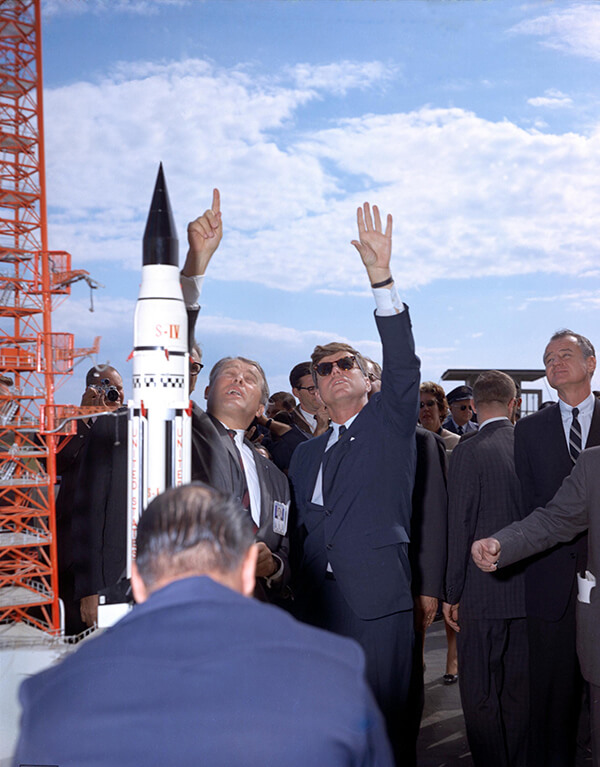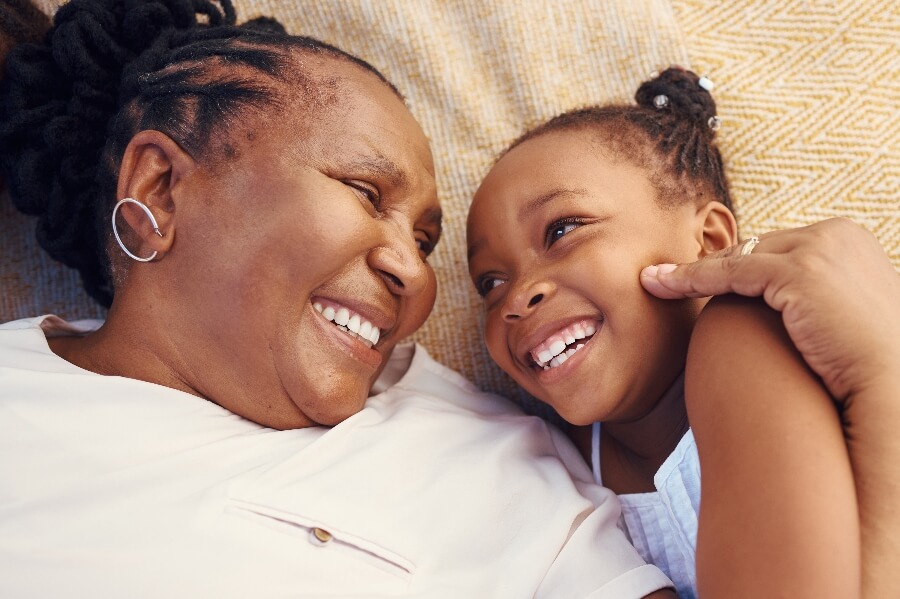Her uncle JFK inspired us to set our sights on the moon, so it’s entirely fitting that Bobby Kennedy’s daughter Rory Kennedy—one of America’s most prolific and highly honored documentary filmmakers—would take on the history of NASA for her most recent project. This past Saturday night, October 13—capping a week that marks the 60th anniversary of NASA’s founding—Discovery aired her latest film, Above and Beyond: NASA’s Journey to Tomorrow (soon to be available on demand), which the New York Times called “a heartening tribute to NASA.”
What these scientists were telling me is, ‘We’re gonna have a train wreck.’

A still of JFK from Rory’s Above and Beyond documentary .
But, with the exception of her movie about the innovative, bad-boy surfer Laird Hamilton and her favorite work, Ethel (the five-time-Emmy-nominated film about her indomitable mother), Rory Kennedy’s films almost always have a social-issues message. The message of this new one, written and co-produced by her husband, Mark Bailey, is that NASA isn’t just looking at the solar system—it’s looking at the Earth and seeing something dangerous. Rory, who co-wrote an op-ed with Mark about NASA’s view of our own planet climate change, says that NASA early on found out that the earth’s environment is “fundamentally fragile” and, because of greenhouse gas emissions, the agency is now “in the odd position of monitoring a developing planetary crisis that President Trump himself has dismissed.”
She tells NextTribe, “What these scientists were telling me is, ‘We’re gonna have a train wreck.’ It’s communicated in the film, but those sobering words were said to me by Piers Sellers, an astronaut and meteorologist, before he died [in 2016]. NASA has a great knowledge of the health of the planet, and they are sending a very urgent message to Congress: The health of the planet is not good. Unfortunately, we have a leader now who is a climate denier, and he loves talking about ‘clean, beautiful’ coal. So we’re heading in the wrong direction.”
The Hollywood Gender Gap
Rory was a women’s studies major at Brown University and has been a fierce feminist ever since. You don’t name your production company Moxie Firecracker if you’re anything but! So maybe it’s no surprise that she sees the terrific groundswell of female documentarists as both a good thing and a sign of a problem.
On the plus side: look at all the female talent. Rory’s partner is another terrific female documentarist, Liz Garbus, among whose many accomplishments include her Emmy-nominated The Fourth Estate, about the New York Times covering the Trump White House, and What Happened, Miss Simone?, about iconic singer Nina Simone, which won a Peabody Award and six Emmy nominations.
Then there’s mega-award-winning documentarist Susan Lacy, who gave us the excellent Jane Fonda in Five Acts and the Emmy-nominated Steven Spielberg biopic, All In One Year. There’s Amy Berg, who gave us the Janis Joplin biopic Little Girl Blue and whose investigative documentary West of Memphis essentially freed the “West Memphis Three”—young men wrongly accused of murder. Julie Cohen and Betsy West gave us the summer’s hit RGB, about Ruth Bader Ginsburg. And more.
Sure, there’s Ken Burns and Alex Gibney, but the women are the ones we are hearing about more and more. While Rory says that, indeed, “women are compassionate and good story tellers,” she strongly feels that the real reason has to do with money and gender. She says: “When you look at Hollywood’s history, you’ll see that women are excluded from higher budget projects. (Documentaries are far less expensive to make.) A study showed that, of the top hundred highest budget films, only four to six were directed by women. Now look at the figures for documentaries: 37 to 40 percent of documentary filmmakers are women. And it’s going to go much higher. I attribute that to the fact that our budgets aren’t $100 million. When you get real, significant money, the power is in one place: with men.”
Is it getting better? We keep thinking—via Ava Duvernay and Patty Jenkins and other women who are major feature film directors—that it is getting better.
“In some ways it’s getting better,” Rory says. “In some ways not. Not with the big budget films and with the people running the studios—there’s not significant headway.”
Spoken like a true feminist—giving no quarter to happy talk in the middle of the fight.
We can’t help but thinking that Rory’s next project may be a documentary about some aspect of the Trump Administration. Rory allows, “That is one of the projects I’m considering.”
We eagerly await.




















0 Comments